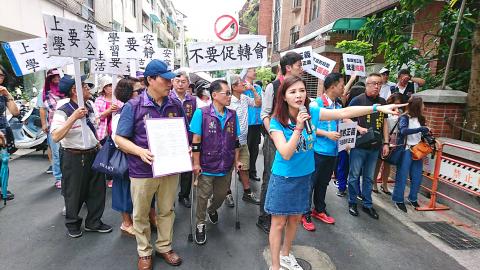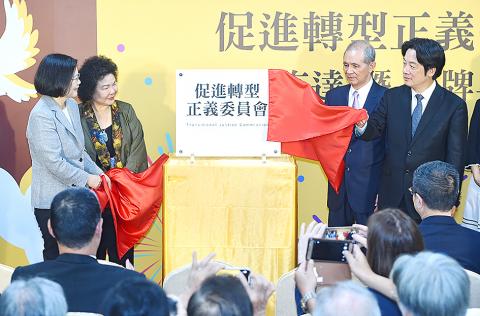The Transitional Justice Commission tasked with uncovering the history of political repression during the Martial Law era was formally launched yesterday at a ceremony attended by President Tsai Ing-wen (蔡英文) and Premier William Lai (賴清德).
It was time to close the era of authoritarianism and that the establishment of the commission was a testament to the nation’s consolidated democracy, Tsai said in a speech at the ceremony.
Over the past 30 years of democratization, Taiwan has had little awareness of the importance of transitional justice, she said.

Photo: Chen Yu-fu, Taipei Times
As a result, work on promoting transitional justice has been focused mainly on distributing compensation or issuing certificates of restored reputation to victims of political repression, she said.
Governments of the past did not embark on a systematic truth-seeking investigation to establish responsibility and failed to set up a legal mechanism for the rehabilitation of victims, she added.
As the government did not do enough in those areas, the wounds that were inflicted on the nation’s history have not healed, which makes it difficult to enter the phase of dialogue and reconciliation, Tsai said.

Photo: Liao Chen-huei, Taipei Times
However, “we are going to get out of that plight, starting today,” she said.
Citing the examples of Germany, South Africa and South Korea, Tsai said special organizations to promote transitional justice have been established in many other nations.
The first mission of the commission would be to issue an accurate report on the era of authoritarian rule under the then-Chinese Nationalist Party (KMT) regime, Tsai said.
Also speaking at the ceremony, Transitional Justice Commission Chairman Huang Huang-hsiung (黃煌雄), a former legislator and Control Yuan member, told the ceremony that the main task of the commission would be to seek and disclose the facts of the authoritarian era, rather than to settle old scores and incite enmity.
Over the next two years, the commission would submit accurate reports on the era of authoritarian rule to ensure accountability and to make sure justice is served so that integration of various ethnic groups can be achieved, he said.
In accordance with the Act on Promoting Transitional Justice (促進轉型正義條例) passed in December last year, the commission consists of nine members, including three from the same political party, and no fewer than three men or women.
The main tasks of the commission are to make political archives more readily available, remove remnants of the nation’s authoritarian past, redress judicial injustice, produce a report on the history of the authoritarian era and take steps to promote transitional justice.

CHAOS: Iranians took to the streets playing celebratory music after reports of Khamenei’s death on Saturday, while mourners also gathered in Tehran yesterday Iranian Supreme Leader Ayatollah Ali Khamenei was killed in a major attack on Iran launched by Israel and the US, throwing the future of the Islamic republic into doubt and raising the risk of regional instability. Iranian state television and the state-run IRNA news agency announced the 86-year-old’s death early yesterday. US President Donald Trump said it gave Iranians their “greatest chance” to “take back” their country. The announcements came after a joint US and Israeli aerial bombardment that targeted Iranian military and governmental sites. Trump said the “heavy and pinpoint bombing” would continue through the week or as long

TRUST: The KMT said it respected the US’ timing and considerations, and hoped it would continue to honor its commitments to helping Taiwan bolster its defenses and deterrence US President Donald Trump is delaying a multibillion-dollar arms sale to Taiwan to ensure his visit to Beijing is successful, a New York Times report said. The weapons sales package has stalled in the US Department of State, the report said, citing US officials it did not identify. The White House has told agencies not to push forward ahead of Trump’s meeting with Chinese President Xi Jinping (習近平), it said. The two last month held a phone call to discuss trade and geopolitical flashpoints ahead of the summit. Xi raised the Taiwan issue and urged the US to handle arms sales to

State-run CPC Corp, Taiwan (CPC, 台灣中油) yesterday said that it had confirmed on Saturday night with its liquefied natural gas (LNG) and crude oil suppliers that shipments are proceeding as scheduled and that domestic supplies remain unaffected. The CPC yesterday announced the gasoline and diesel prices will rise by NT$0.2 and NT$0.4 per liter, respectively, starting Monday, citing Middle East tensions and blizzards in the eastern United States. CPC also iterated it has been reducing the proportion of crude oil imports from the Middle East and diversifying its supply sources in the past few years in response to geopolitical risks, expanding

Pro-democracy media tycoon Jimmy Lai’s (黎智英) fraud conviction and prison sentence were yesterday overturned by a Hong Kong court, in a surprise legal decision that comes soon after Lai was jailed for 20 years on a separate national security charge. Judges Jeremy Poon (潘兆初), Anthea Pang (彭寶琴) and Derek Pang (彭偉昌) said in the judgement that they allowed the appeal from Lai, and another defendant in the case, to proceed, as a lower court judge had “erred.” “The Court of Appeal gave them leave to appeal against their conviction, allowed their appeals, quashed the convictions and set aside the sentences,” the judges